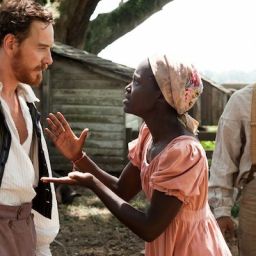by Vivian Obarski

Perhaps it’s that I have a hard time writing critically about what I love and I loved this movie. I love it even though I understand the criticisms against it regarding the N-word, the use of the horrors of slavery as entertainment and a backdrop for a revenge movie and other arguments. But I can’t help it. I love this movie.
I am an unapologetic Tarantino fangirl. I’ve loved his stuff ever since Reservoir Dogs, when he was considered a young turk and the word “Tarantinoesque” hadn’t been invented yet. His movies can be problematic and sometimes he refuses to answer the hard questions laid out, but I still love his work. I look forward to the next phase in his life where he just writes about movies. (Referenced in this interview with Terry Gross on NPR.) I would love to get a mix tape from him because I know it’d be some of the weirdest, but most awesome geeky stuff ever.
But I can say that there is one thing that has been bothering me in mainstream media’s coverage of Django Unchained – the fixation on the use of the N-word, for me, is overly simplistic and shies away from the racial tensions we still encounter today.
I was thinking about this as I was watching Totally Biased on FX and the discussion of Django came up – as they went to the “man-on-the-street” interview, it focused solely on the N-word. There was no discussion about the Mandingo fights, the hot boxes, face masks, and the casual murder and torture of other human beings. Keep in mind, this didn’t happen in ancient Rome — this was less than 200 years ago. We’re still within 50 years of segregation and we still live in a society in which racial discrimination regularly occurs. Let’s not play around — America still has problems with race.
Critics acknowledge that the movie is controversial, but many of them haven’t delved deeply into the “why” portion, save for a few online essays and interviews (among those I really enjoyed Samuel Sattin and Roger Ebert) that discuss it. But I also don’t think that this is a discussion that Tarantino and crew should be doing for us. They’re the ones who tell the story and what we take away from it is the most important thing. Django, to me, is a classic Tarantino movie. It uses the issue slavery as the jumping off point for a standard revenge movie – but also shows the horrors of slavery in a way that I haven’t seen (given that I haven’t seen Roots). It’s not shying away from the horrors by showing “dignified suffering.” It’s not a message movie like Schindler’s List or The Reader. It’s catharsis for me (and I suspect many others) in watching the bad guy get theirs. We may not be able to get the same vengeance, but it feels good watching someone else do it – even if it’s fiction.
And it’s not just about what happened almost 150 years ago. It’s about mainstream media now and how we consume it. Could a black writer-director be able to produce this and enjoy the same success? Is the treatment of slavery in this movie “entertainment” or is it an unflinching look that is harsher than that we’re used to seeing?
Personally I fall in the line of Reginald Hudlin where I had no interest in seeing another film about “noble suffering” or where slavery is simply the backdrop for another ponderous dramatic film in which Abraham Lincoln discusses the issue of emancipation with a bunch of white dudes. We all know slavery happened. We all know it was ugly. But what we miss in our “hit-the-highlights” reel of American history that most of us get is the depth of horror and suffering and the discomfort we still have with it today.
Hell, even the nervous laughter from the “Kill white people and get paid for it? What’s not to like?” line indicates that we know that there’s this tension, but no one wants to acknowledge it, unless confronted with it (which reminds me of another brilliant scene with Don Johnson’s character as he attempts to explain to his slaves how they should treat the freeman Django – differently, but not as an equal to himself.)
Tarantino may be gleefully shoving our faces in the violence and gore and he may dance around the questions regarding race, but that doesn’t mean we as viewers have to avoid it. We have the opportunity to discuss the issues and place them in context of our own lives. But by focusing solely on the N-word and the over-the-top violence, we’re missing out on an opportunity to have a thoughtful discussion on the lasting impact slavery has had on our society.


